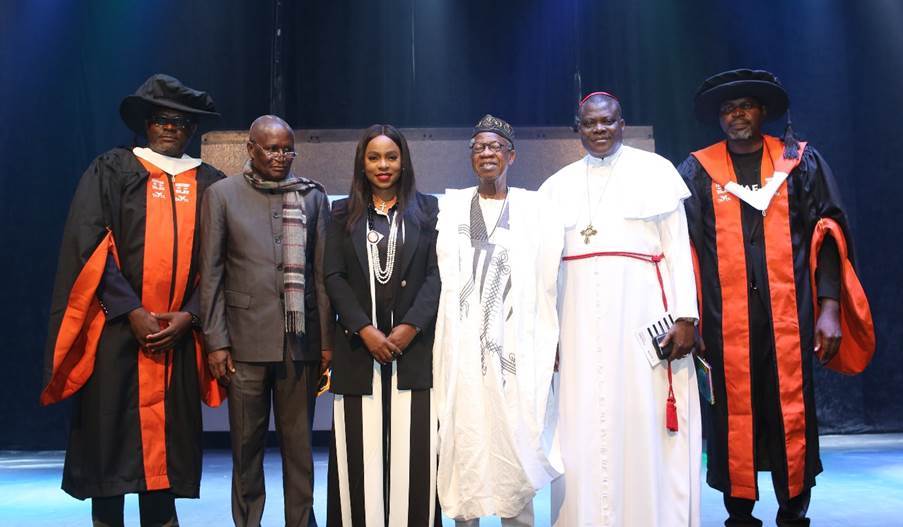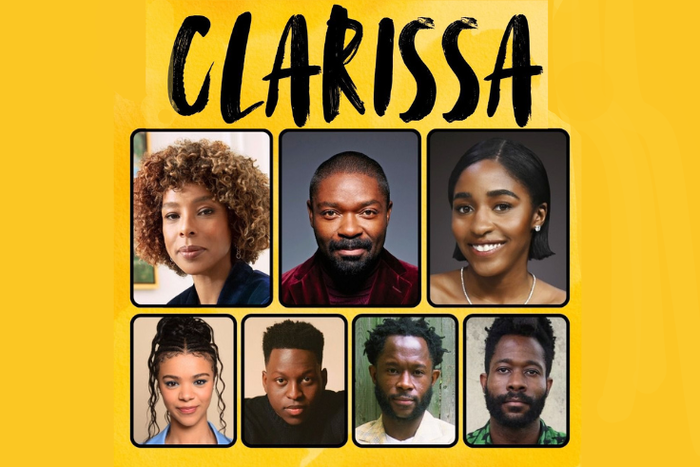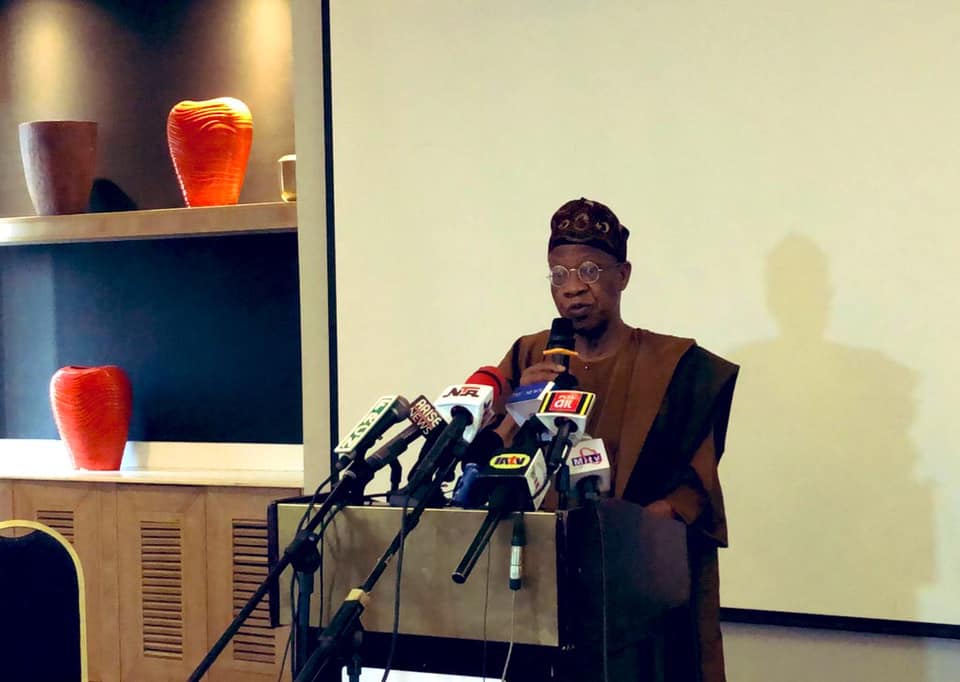Showbiz
TAFTA Helping to Solve Unemployment Crisis in Nigeria—Lai Mohammed

By Aduragbemi Omiyale
The Minister of Information and Culture, Mr Lai Mohammed, has praised the management of Terra Academy for The Arts (TAFTA) for its contribution to helping the government to solve the unemployment crisis in Nigeria.
Speaking last Friday at a ceremony in Lagos for the graduation of the first cohort of the organisation, he promised that the government would support TAFTA so as to lift more youths from poverty.
TAFTA is a provider of world-class creative education, career support, and entrepreneurial opportunities. It is an initiative of Terra Kulture, headed by Ms Bolanle Austen-Peters.
Its goal is to build and empower a community of young Nigerians who will impact the economy and society by transforming the creative industry.
TAFTA offers an innovative curriculum with specialised courses in sound design, stage lighting, animation, and scriptwriting, all of which were incorporated with entrepreneurship modules.
In his keynote address, Mr Mohammed said, “Nigeria’s creative industry is the new crude oil. Today, Nigeria has taken the world by storm and found itself in the global space, be it through music, movies, fashion, literature, or theatre.
“As Nigeria’s population comprises a 70 per cent youth demographic, many of whom are unemployed or underemployed, TAFTA could not come at a more auspicious time.
“I can say with conviction that TAFTA is contributing its quota to the efforts to solve the unemployment crisis in Nigeria.
“I also want to congratulate the graduates and admonish them to make the best use of this rare opportunity afforded to them.
“TAFTA continues to be a partner of progress, and its efforts are impressive and highly commendable. The Ministry looks forward to exploring greater means of partnerships with TAFTA to extend their invaluable training across the length and breadth of Nigeria,” the Minister said.
In her speech, Ms Austen-Peters explained that, “The dream of TAFTA is a story of possibilities. It was during the pandemic when industries were shutting down, and few were harder hit than the creative industry, that we realized how important it is for us to use our creativity to create wealth.
“As Terra Kulture, we trained hundreds of talents each year who have become superstars in their respective fields, an opportunity we wanted to extend to the greater public.”
Speaking further, she said, “TAFTA was established as a gateway to impacting the lives of young Nigerians. The training we provide allows our graduates to build their entrepreneurial skillsets, ensuring that they are capable of providing for themselves and their families.
“I am delighted that what was thought impossible has been made possible. My sincere congratulations to our graduates today who have taken the next steps to transform their lives.”
Terra Academy for the Arts was launched in 2021 with the mission to upskill 65,000 underserved Nigerian youths through innovative, creative education and practical training strategically designed by handpicked experts in the creative industry.
The initial program runs for six weeks, with an additional two-week practical workshop designed to ensure the hands-on application of the course materials.
Notable alumni from the academy include Moshood Fattah, best known for his role as ‘Michael’ in Netflix’s hit series “Far From Home”; Queen Celestine, Theatre performer and Miss Nigeria Universe 2014; and Bunmi Olunloyo, actor, dancer, and fitness instructor.
Present at the graduation ceremony hosted by Akah Nnani were Prof. Duro Oni, President of the Nigerian Academy of Letters; Rev Olasupo Ayokunle, President of the Christian Association of Nigeria (CAN); Femi Odugbemi, award-winning Filmmaker; Omotola Jalade Ekeinde, actress; Deyemi Okanlawon, actor; and Mike Afolarin, actor; amongst other key players in the industry.
Showbiz
Afreximbank-Backed CCInc Invests in Nigerian Feature Film Clarissa

By Adedapo Adesanya
The intellectual property investment subsidiary backed by Afreximbank’s Fund for Export Development in Africa (FEDA), CANEX Creations Incorporated (CCInc), has announced an investment in the feature film Clarissa, a Nigerian-produced drama directed by twin filmmakers, Arie and Chuko Esiri.
A contemporary reimagining of Virginia Woolf’s novel, relocated to Lagos, Clarissa was shot on 35mm in Lagos and Delta States. The film follows society woman Clarissa as she prepares to host a party at her home, only to encounter once-intimate friends from her youth. Over the course of a single night, memories of intricate relationships, passionate love, hidden desires, and lost aspirations give rise to a bittersweet reckoning.
The film has been acquired for worldwide distribution by NEON, which will oversee theatrical release in the United States and international markets, with NEON International handling foreign sales.
Clarissa features an acclaimed ensemble cast including Sophie Okonedo (Academy Award and Emmy Award nominee), David Oyelowo (Golden Globe and BAFTA nominee), Emmy Award winner Ayo Edebiri, alongside India Amarteifio (Bridgerton), Toheeb Jimoh (Ted Lasso), Nikki Amuka-Bird (Knock at the Cabin), and a broader cast of distinguished performers.
The film is written, directed, and produced by Arie and Chuko Esiri, whose debut feature Eyimofe (This Is My Desire) premiered at the Berlinale, won multiple African Movie Academy Awards, and was subsequently released by Janus Films before being selected for the Criterion Collection, a rare distinction that signals enduring artistic significance.
The Esiri brothers produce Clarissa alongside Theresa Park (Per Capita Productions) and Nicholas Weinstock (Invention Studios), with co-producers Nina Gold and Thomas Bassett. Executive producers include Sophie Okonedo, Dolly Omodolapo Kola-Balogun, Osahon Okunbo, and Jason Reif.
Commenting on the investment, Mr Osahon Akpata, Chief Executive Officer of CCInc. said, “Clarissa exemplifies the type of globally resonant, IP-driven storytelling that CANEX Creations Inc (CCInc) was established to support. The film combines literary heritage, world-class filmmaking, and African production capacity, while remaining firmly rooted on the continent. Its acquisition by NEON validates both the creative ambition of the filmmakers and the viability of Africa-backed financing structures for internationally scalable film content.”
Reflecting on the film’s creative vision, Mr Chuko Esiri, writer, director and producer, said, “From the beginning, it was important to us that Clarissa be both rooted and resourced on the continent where it is set. Having African institutions back a film of this scale reflects a growing confidence that our stories can be produced from within.
“Clarissa is a story centred on time and memory, and in bringing it to life, we chose to shoot on 35mm in the hope it will first feel, then stand next to the great films of modern cinema”.
Production financing for filming in Nigeria was provided entirely by Africa-based institutions, led by CCInc. alongside MBO Capital, underscoring the growing capacity of African capital to support globally competitive film projects.
The acquisition was negotiated by NEON’s Kate Gondwe, with UTA Independent Film Group representing the filmmakers.
According to a statement, CCInc. said Clarissa marks its continued commitment to investing in high-quality Global Africa intellectual property with clear pathways to international markets, in line with its mandate to catalyse export-ready creative assets across film, television, music, fashion, and other IP-intensive sectors.
Showbiz
Spotify Reports 163.5% Average Streaming Growth in Nigeria

By Adedapo Adesanya
Spotify says music streaming in Nigeria has grown at an average rate of 163.5 per cent, underscoring the speed at which the country has emerged as a global streaming force since it launched here in 2021.
In a statement, the music streaming company reported triple-digit year-on-year growth in its early years and sustained momentum through 2025.
The platform, which entered the Nigerian market in February 2021, described the journey as one marked by rapid cultural acceleration.
Spotify said at the heart of that growth was Afrobeats, which recorded a 5,022 per cent increase in streams locally between 2021 and 2025.
It added that other genres also witnessed remarkable expansion. According to the platform, Amapiano surged by 10,330 per cent; Gospel and Praise grew by 5,499 per cent; Hip-hop and Rap rose by 3,020 per cent; while R&B climbed by 2,602 per cent.
Spotify further said language had become another growth engine, with indigenous-language listening increasing by 554 per cent in 2024 and 87 per cent in 2025 within Nigeria.
Globally, indigenous-language streams rose by 141 per cent in 2024 and 41 per cent in 2025, reflecting what the company described as a growing appetite for local-language storytelling and sound.
According to Spotify, listening habits reflected global curiosity from day one. The first track streamed in Nigeria at launch was “到此為止” by Shiga Lin, reinforcing the platform’s view that Nigerian users are eclectic and open to discovery.
Over the five-year period, the most-streamed artists in Nigeria include Burna Boy, Davido, Asake, Wizkid and Seyi Vibez.
Among the most replayed songs are ‘Remember’ and ‘Lonely At The Top’ by Asake; ‘Kese (Dance)’ by Wizkid; ‘Doha’ by Seyi Vibez; and ‘With You’ by Davido featuring Omah Lay.
The platform said the number of Nigerian artists on Spotify has grown by 158 per cent since launch, while users have created more than 25 million playlists within the period.
According to the company, in 2025 alone, Nigeria recorded over 1.4 million play hours on the platform.
Spotify also noted that podcast consumption is expanding, with more than 59 billion total podcast hours streamed since its launch.
The platform added that user behaviour reflects a young and adventurous market, with the average listener aged 26. In recent months, Nigerians streamed an average of 150 different artists, which Spotify described as evidence of a discovery-driven audience.
Showbiz
Court Freezes N1.2bn Copyright Levy Funds in Record Labels, MCSN Rift

By Adedapo Adesanya
The Federal High Court in Lagos has ordered the freezing of N1.2 billion in copyright levy funds payable to the Musical Copyright Society of Nigeria (MCSN), pending the determination of a substantive application before the court.
Justice Ambrose Lewis-Allagoa granted an interim Mareva injunction restraining the Central Bank of Nigeria (CBN) and no fewer than 20 commercial banks from disbursing or releasing the disputed funds.
The order followed an ex parte application filed on February 5, 2026, in Suit No. FHC/L/CS/207/2026 by the Record Label Proprietors’ Initiative and 11 leading record labels and music companies.
The plaintiffs include Mavin Records Ltd, Davido Music Worldwide Ltd, Premier Music Publishing Limited, Chocolate City Music Limited, Hypertek Digital Limited, Digital Music Commerce & Exchange Limited (DMCE), Beggars Group Media Limited, Universal Music Group, Sony Music Entertainment Africa, Warner Music South Africa (Pty) Ltd and Gamma Media Middle East DMCC.
The second to 12th plaintiffs instituted the action through their lawful attorney, Record Label Proprietors’ Initiative.
In the motion ex parte, filed and argued by their counsel, Oragwu Nnamdi, the applicants sought an order restraining the CBN from disbursing, releasing, transferring or otherwise paying out any copyright levy funds attributable to sound recordings and intended for MCSN, pending the hearing and determination of a Motion on Notice.
They further prayed the court to restrain MCSN, its agents, servants or privies from receiving, accessing, withdrawing, transferring, dissipating or otherwise dealing with the levy funds, whether paid directly by the CBN or routed through commercial banks.
The plaintiffs also requested that the apex bank and the affected financial institutions be directed to preserve the funds and file affidavits of compliance within three days of service of the order, disclosing the sums standing to the credit of MCSN in respect of the levy payments.
Ruling on the application, Justice Lewis-Allagoa restrained the CBN, its officers, agents or any person acting under its authority from disbursing any copyright levy funds attributable to sound recordings and payable to MCSN, pending the determination of the Motion on Notice.
The court equally barred MCSN from receiving, accessing, utilising, withdrawing, transferring, converting, dissipating or otherwise dealing with the funds, whether already received or yet to be disbursed.
In addition, the judge directed the CBN and the listed banks to preserve the disputed sums and file affidavits of compliance within three days of being served with the order, disclosing the amounts standing to MCSN’s credit in respect of levy payments earmarked for disbursement or already disbursed.
The court further ordered that any copyright levy funds already received by MCSN and attributable to sound recordings owned by the 2nd to 12th plaintiffs — after they had validly opted out of the collective management and administration of their rights — must be preserved intact.
MCSN was also directed to render an account of such funds and refrain from further dealings with them pending the hearing of the Motion on Notice.
Dr Chinedu Chukwuji of Lekki, Lagos, deposed to the supporting affidavit.
After hearing submissions from counsel to the plaintiffs, the court granted the orders as prayed and adjourned the matter to March 12, 2026, for hearing of the Motion on Notice.
-

 Feature/OPED6 years ago
Feature/OPED6 years agoDavos was Different this year
-
Travel/Tourism10 years ago
Lagos Seals Western Lodge Hotel In Ikorodu
-

 Showbiz3 years ago
Showbiz3 years agoEstranged Lover Releases Videos of Empress Njamah Bathing
-

 Banking8 years ago
Banking8 years agoSort Codes of GTBank Branches in Nigeria
-

 Economy3 years ago
Economy3 years agoSubsidy Removal: CNG at N130 Per Litre Cheaper Than Petrol—IPMAN
-

 Banking3 years ago
Banking3 years agoSort Codes of UBA Branches in Nigeria
-

 Banking3 years ago
Banking3 years agoFirst Bank Announces Planned Downtime
-

 Sports3 years ago
Sports3 years agoHighest Paid Nigerian Footballer – How Much Do Nigerian Footballers Earn





















